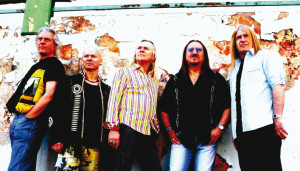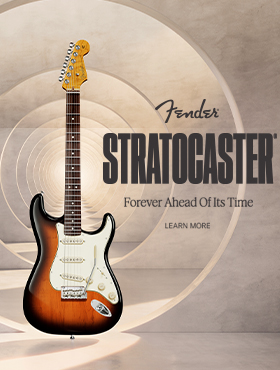URIAH HEEP
December 2010. By Greg Phillips
 Uriah Heep’s only remaining original member Mick Box could be forgiven for feeling short changed. His band shared the same stages and fans as Led Zeppelin and Black Sabbath, sold over 30 million albums, were the first band to play the Soviet Union, and influenced a swag of other bands, including Queen with their pioneering vocal harmony style. Yet, Uriah Heep doesn’t seem to acquire the same level of kudos as those other two hard rock legends. But you won’t find Mick Box complaining. After 40 years, the affable Box is happy be playing to 53 countries around the globe and is looking forward to coming to Australia in April 2011. Greg Phillips spoke to Box about Heep’s long career, his guitar gear and the band’s first Aussie jaunt in over two decades.
Uriah Heep’s only remaining original member Mick Box could be forgiven for feeling short changed. His band shared the same stages and fans as Led Zeppelin and Black Sabbath, sold over 30 million albums, were the first band to play the Soviet Union, and influenced a swag of other bands, including Queen with their pioneering vocal harmony style. Yet, Uriah Heep doesn’t seem to acquire the same level of kudos as those other two hard rock legends. But you won’t find Mick Box complaining. After 40 years, the affable Box is happy be playing to 53 countries around the globe and is looking forward to coming to Australia in April 2011. Greg Phillips spoke to Box about Heep’s long career, his guitar gear and the band’s first Aussie jaunt in over two decades.
Uriah Heep were a pioneering band and probably don’t get much credit for that but Queen’s sound certainly borrowed a lot from you guys.
When we came on to the scene in the late 60s, the harmonies were all very soft and sweet. We grabbed hold of it, because we had five singers in the band, we used harmony almost as another instrument. It became our trademark. So by making that strong statement, I think a lot of people jumped on the band wagon, and yeah, I’m sure Queen borrowed a bit. (laughs)
Was there a sense of competition between UK bands in the 70s?
We were all mates to be honest. I think the one element that gets overlooked though, was that in those days, everyone was an individual. It was the sum of the parts that gave each band their particular flavour. I never played guitar like Ritchie Blackmore. Ritchie didn’t play like Tony Iommi. Tony didn’t play like Paul Kossoff. Paul didn’t play like Martin Barre and Martin didn’t play like Jimmy Page, and on it goes. And that went for the bass players, the drummers, the singers, the keyboard players. Everyone had their own individual thing and as I said, the sum of those parts gave each band their own particular flavour. I think that is missed a lot on today’s music. It’s a bit like a jigsaw puzzle, you take one piece out, put another one in and you wouldn’t know anything has changed. It was very important to have that individuality in those days.
Do you have any favourite road stories from those days?
I remember the first date of an American tour in Birmingham, Alabama. We had a black carpet. A lot of bands had white, but ours was black. There was a healthy competition. Being the first night, the crew would usually tell me where the lighting trusses were. I would run onto this black carpet runway and all of the lights would come on and I would be able to see where I was at the edge of the stage. This particular night, nobody told me and I ran straight out and off the edge of the stage. I dislocated my right arm. But, it’s an even funnier story because our tour manager had been out and brought a nurse back and she bent my right arm back in place. Then I looked over and saw a bottle of brandy and I thought, I’m going to dull this pain now. So I drank copious amounts of that. Doctor Remy I called it. The end result was that at the end of the show, we went to do the bow, where everyone puts their arms around each other, and of course my arm was very sore. So sore in fact, there was this shot of pain and I fell back into the orchestra pit again and broke my left wrist in four places. But, saying that, I did the next show in Detroit to ten thousand people and carried on for three months, with four broken bones in my left wrist. I had three injections a night and I think I must have seen every hospital in America.
What is your main road guitar now?
I have been lucky enough to have my own signature guitar now.
They are made by a company in Canada called Carparelli. So they made a Mick Box model and
I use those. It’s based around a Les Paul. It got to a situation where I’d have all of my good Les Pauls out on the road and with all the touring we do, we play 53 countries, you can imagine the amount of travel we do. The airlines were just destroying them. So I thought, I will leave all of those at home and look for something else. So now I have these Carparellis and they have been absolutely
superb. I also have another affiliation with Canada … I use Wyres strings and within the next week, I will have my own Mick Box signature strings out then.
I assume you’re still playing through a Marshall?
Quite often with the different territories we play, you can’t take your own equipment and it is hired, but a JCM800 would be fine. I don’t really need a lot to be honest. Pedal-wise I just use a Cry Baby wah wah, a distortion pedal which I am just changing from a Seymour Duncan Lava pedal to an Ibanez Tube Screamer, and I use a chorus and that’s it. I don’t use any more. Most of it is in the hands. I keep it simple and I like the sounds to be very open. I don’t like that compressed sound that guitarists go for now.
In the early days you were creating sounds and pioneering a genre. These days all of those old sounds are programmed into keyboards and multi effect units. While it makes creating music easier, do you think though it makes creating new ideas and new sounds harder?
It does to a degree because it is all there for you, whereas we had to go and find it. I’ll give you an example. If you listen to our song ‘The Wizard’, what you would think is one note on a keyboard, is actually a kettle that had boiled in the kitchen with a whistle on it. When we listened to a playback, we heard it in the back of the kitchen and we thought how great would it be to have that for that one note. We went in and recorded the whistle from the kettle, vary-speeded it, put it in tune and that’s what you hear. There was a lot more adventure involved then.
Whose idea was it to re-record some of the classic Heep songs for the recent On the Rebound album?
We did it for the album Celebration too, the 40th anniversary album. To be honest, it was a record company idea. Being the 40th anniversary, why not re-record some of the hits. I said at the time, what’s the point? Those songs will never be bettered, they’re set in stone. But then I thought, why don’t we record them as a band in the studio with everything going down live and show everyone we still have the same energy and passion as we’ve always had … and this is the band that goes out and plays them. To be honest, if you have never heard of Uriah Heep, that wouldn’t be a bad place to start.
What can we expect from the Australian tour?
I think we’ll hit most of the forty years. We’ll certainly do quite a bit of the Celebration stuff. We’ll do a lot of the classics … July Morning, Gypsy, Easy Livin’, Stealin’ and change that around a bit and probably a few songs we haven’t played for a long while, too.


